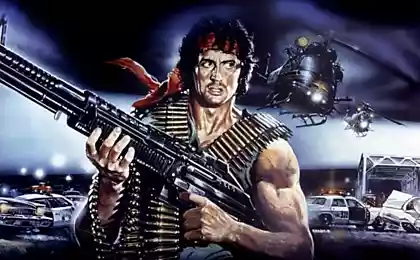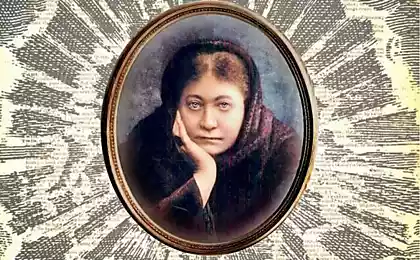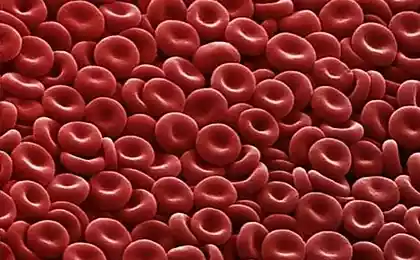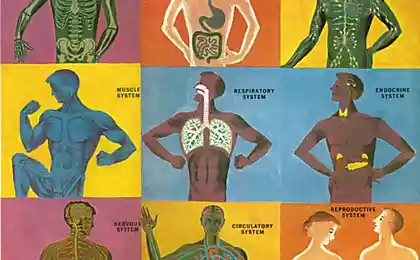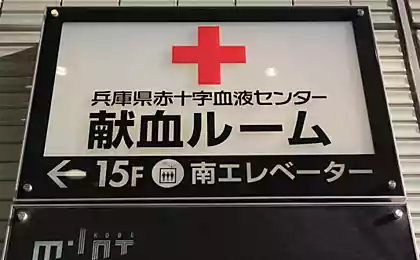1083
My blood will nourish India
Good day PLs.
I would like to present you some information about famous women Indira Gandhi.
5 photos.
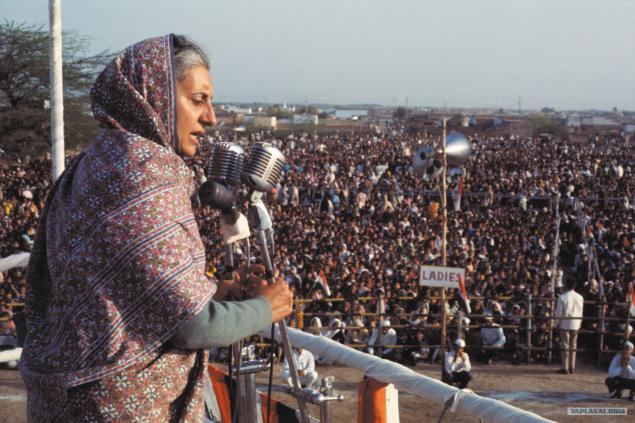
1. "Hindi Rusi bhai bhai»
At the turn of the 1970s - 1980s in the Soviet Union knew two foreign women politicians, which is powered directly opposite feelings.
British Prime Minister Margaret Thatcher advocated living embodiment of imperialist evil, while the head of government of the former British colony of India was regarded as the best friend and the personification of the struggle of the "third world" for a bright future.
Such a relation to Indira Gandhi promoted and friendly relations linking the USSR and India in the post-war period, and the personal charm of this woman.
In fact, Indira Gandhi, of course, not all the time was like dancing and singing heroine so beloved Soviet citizens of Indian films.
Madam Prime Minister was the policy of harsh, sometimes violent, in no way inferior to their British counterparts, which, incidentally, came much later in the policies of Indira Gandhi.
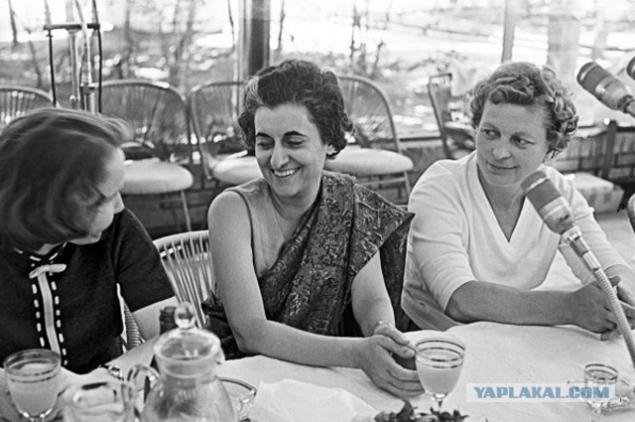
2. The daughter of his father
The daughter of the first prime minister of independent India, Jawaharlal Nehru was educated in England and returned home became personal secretary of his father, accompanying him on a business trip. Over time, the growing experience of Indira, and with it, and its influence in the political life of the country.
Women politicians were at that time unusual phenomenon not only for India but for the whole world.
In 1964, Jawaharlal Nehru died, man, above whose authority in the country was only the authority of Mahatma Gandhi.
By the way, contrary to popular belief, Indira Gandhi is not a relative of Mahatma Gandhi.
Within two years after the death of Indira Gandhi's father served as minister of information and broadcasting, and in 1966 led the government, becoming the second female prime minister in the world.
49-year-old Gandhi was at the helm of the country, languishing on the economic, social, domestic and foreign policy issues.
In India, with its complex structure of caste, inter-religious problems, low status of women was difficult to achieve something by cautious steps based on consensus.
Prime Gandhi acted decisively, not afraid of no quarrels with former associates or military conflict with neighboring Pakistan. In the political life of the victim was brought to life personal. Sacrificing personal good, Indira Gandhi sought the same from others and that is not always understood.
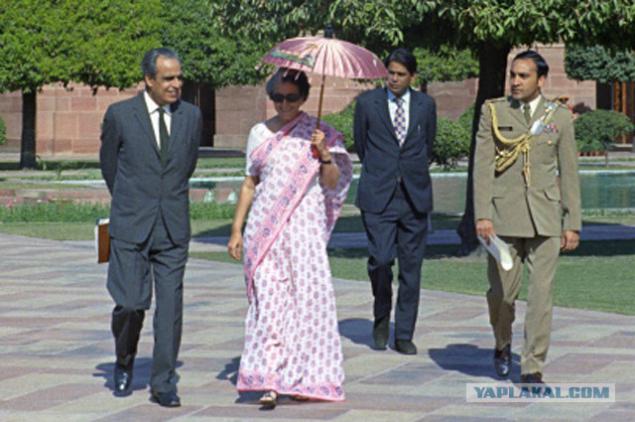
3. "Mother Nation»
Nevertheless, the development of India's move forward thanks to the measures undertaken by the Prime Minister.
When opponents were close to having to force it to retirement, she had no qualms imposed a state of emergency.
In 1977, however, the party of Gandhi suffered a crushing defeat in the election, and Mrs. Prime Minister has resigned.
It seemed to collapse. She was accused of corruption, was taken into custody, it seemed that her political career is over. But she again showed character. Gathered his supporters in a single fist, in 1980 Indira Gandhi won new elections and again became prime minister.
Moreover, its prestige and popularity ascended to heaven. If her father, Jawaharlal Nehru, called "the father of the nation", his daughter, by analogy, was awarded the title "mother of the nation."
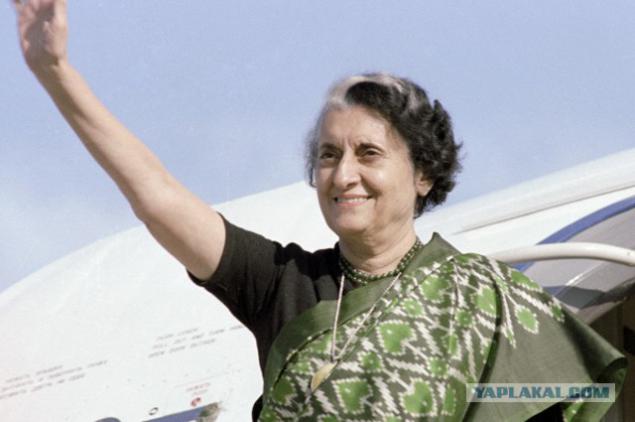
4. "Blue Star»
The popularity and credibility not eliminate the political problems. In the early 1980s, India's government faced the problem of Sikh separatists in Punjab.
Radical extremists demanded the establishment of an independent state in Punjab Khalistan. And it was not a peaceful protest and armed struggle.
Leader of radical extremists Dzharnail Bhindranvale Singh in 1982 settled in the territory of the main shrine of the Sikhs - the Golden Temple in Amritsar. In fact, the temple has become a terrorist base, warehouse and even weapon factories.
Open conflict with the Sikhs in the territory of their main sanctuary threatened severe consequences. Indian Prime Minister understand that perfectly. However, she understood and more - inaction power in this situation even more dangerous.
Division 9th Infantry Division of the Army of India in early June 1984 blocked the temple, engaging in periodic skirmishes. The situation is complicated yet and that in the temple, in addition to the terrorists, were hundreds of peaceful pilgrims.
Nevertheless, Prime Minister Indira Gandhi gives the order to conduct military operations "sweeping" the temple, dubbed "Blue Star».
June 5 militants was given an ultimatum - to immediately leave the temple. The complex is only 129 people left. The same evening, army units began the assault.
Managed to break the resistance fighters after using tanks. "Cleansing" of the temple lasted until June 9.
According to official data, during the storm killed 83 soldiers and 492 people inside the church - both militants and civilians pilgrims, including 30 women and 5 children. Among those killed were the leader of the extremists Dzharnail Singh Bhindranvale.
However, radicals argued that troops killed up to 10 thousand Sikhs, mostly civilians.
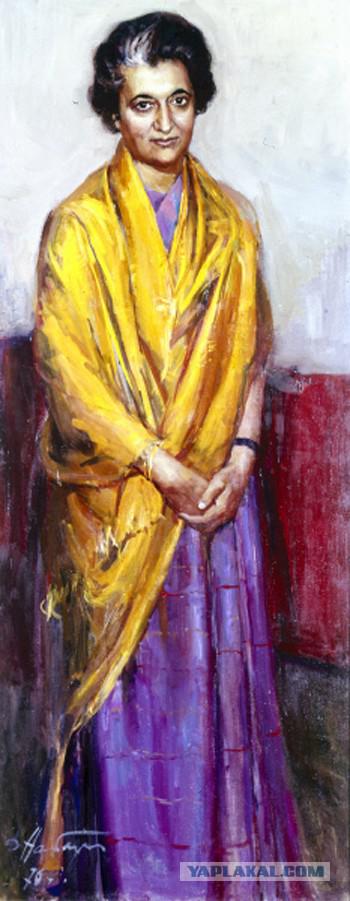
5. Revenge of the Sikhs
Managed to solve tactical problems, but many believed that strategically storming of the temple was a mistake. In the Army of India serves many Sikhs after the operation "Blue Star" began their desertion.
Indira Gandhi warned - extremists will try to take revenge. She strongly advised to change the guard, consisting of the Sikhs, but the prime minister believes that such mistrust can only exacerbate the split in society.
She was advised to wear a bulletproof vest, but she just waved: "It fills me».
Indira Gandhi was not a careless man, and perfectly understood the looming threat. But when she talked about the danger, she cites the example of Mahatma Gandhi, who died at the hands of a fanatic, but not renounced his principles. "The martyr's death - not the end but only the beginning," - said Prime.
On the morning of October 31, 1984 at Indira Gandhi was scheduled TV interview with British writer Peter Ustinov. Dressed for the meeting, she went to the waiting room on the track through the open courtyard.
Along the edges of the track on duty two Sikh bodyguards - Beant Singh and Satwant Singh. Having caught up with them, the Prime Minister welcomed the guards. In response, one of them drew a revolver and fired three bullets into the woman. Following his partner opened fire.
Then the doctors discover the body of Indira Gandhi 20 bullets. Despite this, she was still alive. The shots came running into the yard the other guards, assassins shot on the spot. Prime Minister rushed to hospital, but doctors could not help anything - the vital organs were struck by eight bullets.
Prime Minister Rajiv Gandhi, Indira Gandhi went on a course and shared her fate - in 1991 he was killed by a suicide bomber from the organization "Liberation Tigers of Tamil Eelam" - in response to the entry of Indian troops in Sri Lanka.
Shortly before his death, Indira Gandhi said: "All the allotted in this life, my days will be converted to the service of the people. And even when I die, I am sure that every drop of my blood will nourish the life of India, making it stronger ».
Of this policy, as opposed to political businessman, requires not only the ability to persuade, but also a willingness to sacrifice for the sake of the country.
In this sense, Prime Minister Indira Gandhi was the master policy.
Partial proof here
ps From myself: How much in the past was interesting and powerful politicians now have them here ...
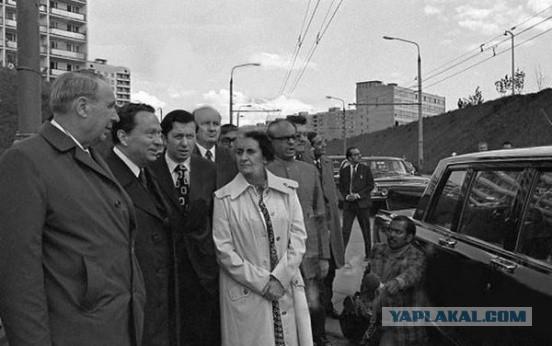
I would like to present you some information about famous women Indira Gandhi.
5 photos.

1. "Hindi Rusi bhai bhai»
At the turn of the 1970s - 1980s in the Soviet Union knew two foreign women politicians, which is powered directly opposite feelings.
British Prime Minister Margaret Thatcher advocated living embodiment of imperialist evil, while the head of government of the former British colony of India was regarded as the best friend and the personification of the struggle of the "third world" for a bright future.
Such a relation to Indira Gandhi promoted and friendly relations linking the USSR and India in the post-war period, and the personal charm of this woman.
In fact, Indira Gandhi, of course, not all the time was like dancing and singing heroine so beloved Soviet citizens of Indian films.
Madam Prime Minister was the policy of harsh, sometimes violent, in no way inferior to their British counterparts, which, incidentally, came much later in the policies of Indira Gandhi.

2. The daughter of his father
The daughter of the first prime minister of independent India, Jawaharlal Nehru was educated in England and returned home became personal secretary of his father, accompanying him on a business trip. Over time, the growing experience of Indira, and with it, and its influence in the political life of the country.
Women politicians were at that time unusual phenomenon not only for India but for the whole world.
In 1964, Jawaharlal Nehru died, man, above whose authority in the country was only the authority of Mahatma Gandhi.
By the way, contrary to popular belief, Indira Gandhi is not a relative of Mahatma Gandhi.
Within two years after the death of Indira Gandhi's father served as minister of information and broadcasting, and in 1966 led the government, becoming the second female prime minister in the world.
49-year-old Gandhi was at the helm of the country, languishing on the economic, social, domestic and foreign policy issues.
In India, with its complex structure of caste, inter-religious problems, low status of women was difficult to achieve something by cautious steps based on consensus.
Prime Gandhi acted decisively, not afraid of no quarrels with former associates or military conflict with neighboring Pakistan. In the political life of the victim was brought to life personal. Sacrificing personal good, Indira Gandhi sought the same from others and that is not always understood.

3. "Mother Nation»
Nevertheless, the development of India's move forward thanks to the measures undertaken by the Prime Minister.
When opponents were close to having to force it to retirement, she had no qualms imposed a state of emergency.
In 1977, however, the party of Gandhi suffered a crushing defeat in the election, and Mrs. Prime Minister has resigned.
It seemed to collapse. She was accused of corruption, was taken into custody, it seemed that her political career is over. But she again showed character. Gathered his supporters in a single fist, in 1980 Indira Gandhi won new elections and again became prime minister.
Moreover, its prestige and popularity ascended to heaven. If her father, Jawaharlal Nehru, called "the father of the nation", his daughter, by analogy, was awarded the title "mother of the nation."

4. "Blue Star»
The popularity and credibility not eliminate the political problems. In the early 1980s, India's government faced the problem of Sikh separatists in Punjab.
Radical extremists demanded the establishment of an independent state in Punjab Khalistan. And it was not a peaceful protest and armed struggle.
Leader of radical extremists Dzharnail Bhindranvale Singh in 1982 settled in the territory of the main shrine of the Sikhs - the Golden Temple in Amritsar. In fact, the temple has become a terrorist base, warehouse and even weapon factories.
Open conflict with the Sikhs in the territory of their main sanctuary threatened severe consequences. Indian Prime Minister understand that perfectly. However, she understood and more - inaction power in this situation even more dangerous.
Division 9th Infantry Division of the Army of India in early June 1984 blocked the temple, engaging in periodic skirmishes. The situation is complicated yet and that in the temple, in addition to the terrorists, were hundreds of peaceful pilgrims.
Nevertheless, Prime Minister Indira Gandhi gives the order to conduct military operations "sweeping" the temple, dubbed "Blue Star».
June 5 militants was given an ultimatum - to immediately leave the temple. The complex is only 129 people left. The same evening, army units began the assault.
Managed to break the resistance fighters after using tanks. "Cleansing" of the temple lasted until June 9.
According to official data, during the storm killed 83 soldiers and 492 people inside the church - both militants and civilians pilgrims, including 30 women and 5 children. Among those killed were the leader of the extremists Dzharnail Singh Bhindranvale.
However, radicals argued that troops killed up to 10 thousand Sikhs, mostly civilians.

5. Revenge of the Sikhs
Managed to solve tactical problems, but many believed that strategically storming of the temple was a mistake. In the Army of India serves many Sikhs after the operation "Blue Star" began their desertion.
Indira Gandhi warned - extremists will try to take revenge. She strongly advised to change the guard, consisting of the Sikhs, but the prime minister believes that such mistrust can only exacerbate the split in society.
She was advised to wear a bulletproof vest, but she just waved: "It fills me».
Indira Gandhi was not a careless man, and perfectly understood the looming threat. But when she talked about the danger, she cites the example of Mahatma Gandhi, who died at the hands of a fanatic, but not renounced his principles. "The martyr's death - not the end but only the beginning," - said Prime.
On the morning of October 31, 1984 at Indira Gandhi was scheduled TV interview with British writer Peter Ustinov. Dressed for the meeting, she went to the waiting room on the track through the open courtyard.
Along the edges of the track on duty two Sikh bodyguards - Beant Singh and Satwant Singh. Having caught up with them, the Prime Minister welcomed the guards. In response, one of them drew a revolver and fired three bullets into the woman. Following his partner opened fire.
Then the doctors discover the body of Indira Gandhi 20 bullets. Despite this, she was still alive. The shots came running into the yard the other guards, assassins shot on the spot. Prime Minister rushed to hospital, but doctors could not help anything - the vital organs were struck by eight bullets.
Prime Minister Rajiv Gandhi, Indira Gandhi went on a course and shared her fate - in 1991 he was killed by a suicide bomber from the organization "Liberation Tigers of Tamil Eelam" - in response to the entry of Indian troops in Sri Lanka.
Shortly before his death, Indira Gandhi said: "All the allotted in this life, my days will be converted to the service of the people. And even when I die, I am sure that every drop of my blood will nourish the life of India, making it stronger ».
Of this policy, as opposed to political businessman, requires not only the ability to persuade, but also a willingness to sacrifice for the sake of the country.
In this sense, Prime Minister Indira Gandhi was the master policy.
Partial proof here
ps From myself: How much in the past was interesting and powerful politicians now have them here ...


